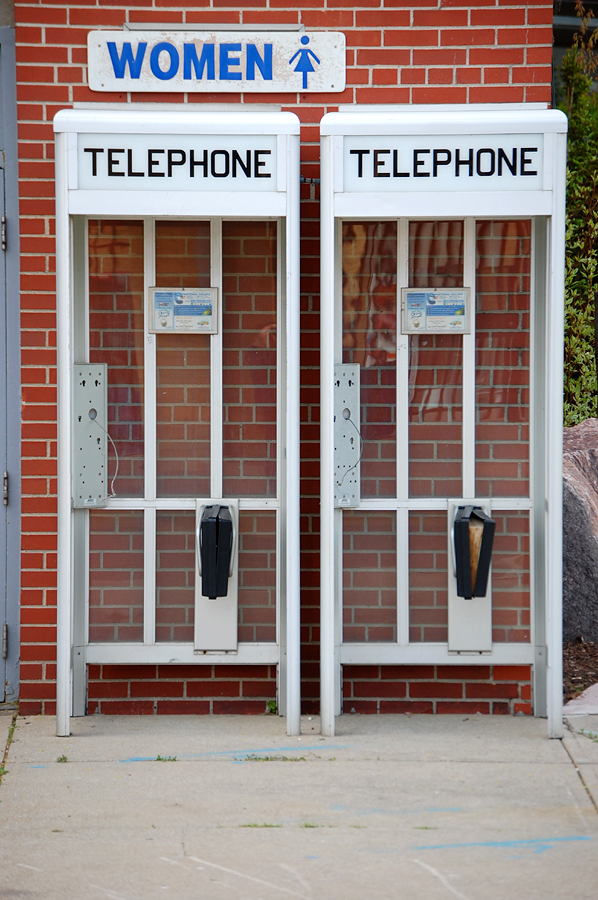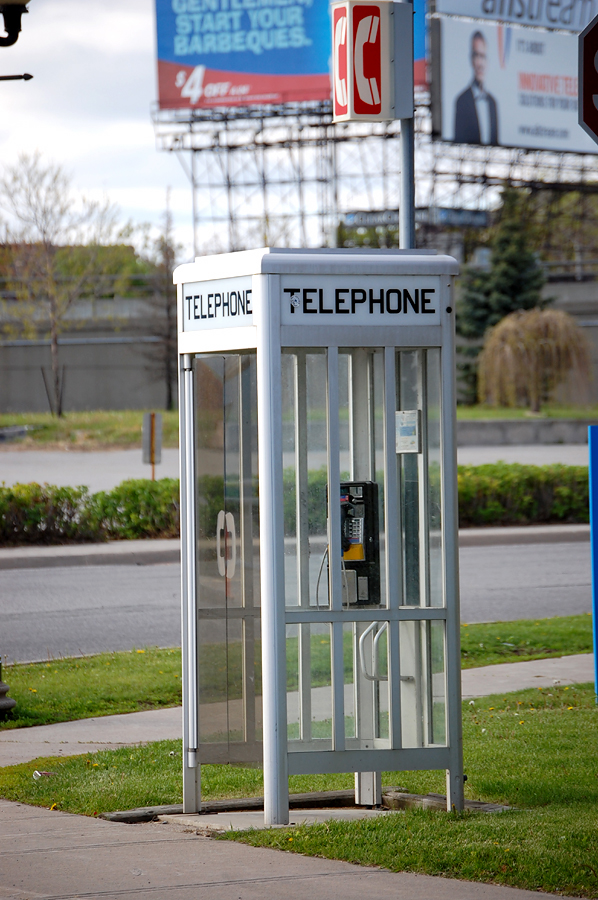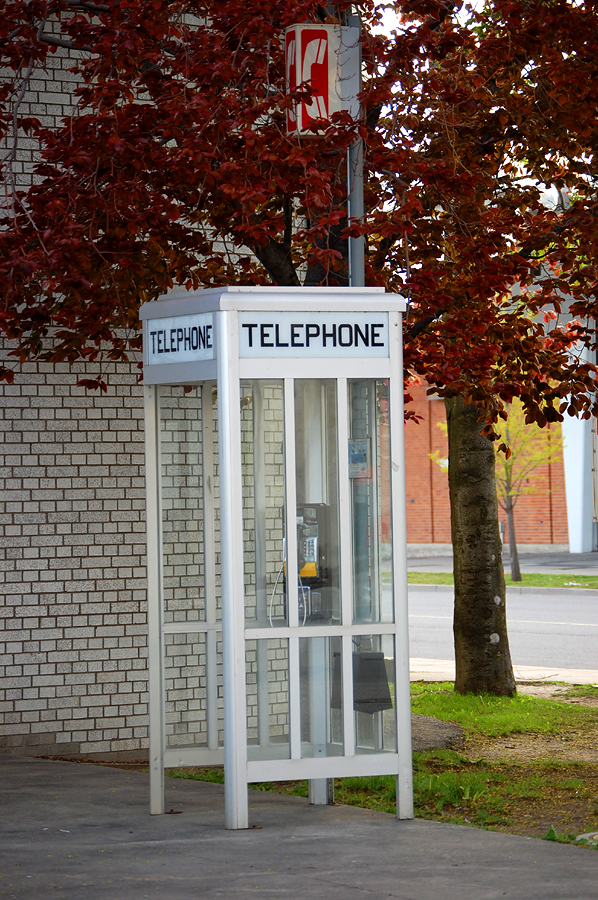
A few years ago I taught an independent media class at Humber College. One of my assignments for the students was to create a tiny publication for ourselves to demonstrate how easy it is to be a self-publisher. The topic of our tiny book was the pay phone.
My students did an inventory of pay phones along major downtown streets at the start of the semester — but four months later at the end of the term, we found that about 10% of the pay phone booths had already been removed. We combined our collective heads to surmise that cell phones were killing off the pay phone (and soon after Bell announced it would raise the price for an individual call from 25 cents to 50 cents). Even the iconic red British telephone booth saw its numbers reduced by 10,000 between 2004 and 2006.
But, as with any piece of street furniture these days, the phone booth is an opportunity to advertise to the masses. A few years back, Bell tried to convince the City of Toronto they should be able to sell third-party ads, but this idea was rejected. In New York City, on-street phone booths actually provide more revenue from advertising than from out-going calls, which means the pay phone demise in the Big Apple may take longer than in other cities.
So, it was with a sense of nostalgia that I walked around the CNE yesterday photographing some of the well-maintained, retro-ish phone booths that dot the Exhibition grounds. These booths represent the changing dynamics of communication in our culture, similar to the shift from telegraph to telephone; from films in movie theatres to TVs in living rooms; and even the shift away from posters on lamp posts to promoting events on Facebook.





16 comments
This makes me sad. As this shift towards everyone carrying their own personal communication device continues, our culture seems to become even more individualistic and antisocial and services less communal. Fortunately I don’t have (or need to have) a cellular telephone, though, so I still have to use booths when I’m out (if I can find one).
Hmmm since I got a mobile phone I find I am able to have a lot more social interaction. Lots more ad hoc finding people and doing stuff — where as before we’d never be able find people if it wasn’t planned well in advance. Mobile technology facilitates human interaction, in my experience, absolutely. I can live out in public space much more freely now and not be tied to a landline somewhere.
I think it’s important to have some phone booths still around – not everyone can even afford a cell phone, and some of us don’t want one – although it makes sense that we no longer need as many as we used to have before cellphones became ubiquitous.
Part of me would be willing to have well-designed, regulated ad space on phone booths if it contributed to keeping them available and less expensive (not full-wraps, though – just a panel or something).
Although, on second thought, the phone companies would probably find some way to abuse ad privileges and make it a problem.
scm – Just because modern times are more practical doesn’t make them less romantic.
Those Bell Canada classic phone booths  with the awkward flapping plastic doors  outlived many booths I remember throughout North America. There’s something particularly good about the idea of slowing, stopping, having to pay attention to your call (and being provided with your own private little glass room in the city in which to do so!) that I think is worth mourning, even if it is way easier to figure out which bar to meet your friends at nowadays.
A decade from now will we be nostalgic for mailboxes, too, I wonder? (The little tiny ones mounted arm-height on utility poles remain my favourites.)
Actually, New York City’s existing pay phone franchise expires in 2010, and there are currently no plans (and no political will) to renew it, meaning The Big Apple’s phone booths may be gone faster than you think.
BTW I meant that phone booths aren’t less romantic, not modern times. Clearly we are living at the height of romantic modernity. Cough.
On (my) other hand, while I see the romance of the phone booth, holding a filthy phone an inch away from ear and mouth to talk and listen to was no fun.
I am as free as I want to be if I turn off my device, which I do. But I am connected a whole bunch of other humans when I turn it on that I couldn’t be as connected to w/out mobile device.
IBM sold its card-punch division, because of video terminals and the PC. Bell is getting out of the phone booth business because of the cell phone.
“Where is Superman when we need him?” Oh, he can’t find a phone booth!
I think the scarcity of pay-phones themselves is even worse than the demise phone booths. I’ve been on many a wild-goose-chase due to my resolve to not carry a cellphone. Even worse are the pay-phones that flash ’emergency only’ on weekends.
Michael: Yeah, it sucks when they do that. The phones in the Grange Park neighbourhood are disabled at night. It’s an attempt to discourage their use by drug dealers.
here’s something i find quite peculiar: payphones are not disappearing at all from the bases of skyscrapers. it’s hard to believe that these banks of payphones make much money for the phone companies. people who work in the towers have their own phones upstairs. most people who visit office towers have blackberries, cellphones, walkie-talkies or some other way to communicate.
reasons for public phones;
* For the homeless to find food, shelter, help (211 and 311 services?)
* To really be anonymous when you call crimestoppers, don’t wnt to be caller id’d by politicians, etc.
* For emergencies when you need to call 911 and your cell is recharging at home
Others?
Has the CRTC really considered who they are cutting off?
@ken
It might make more sense then to provide “public” phones – free but with preprogrammed buttons for emergency services and other free calls. Since those phones would not take money they would have a lower rate of breakage for theft.
Mark> Like old fashioned police call boxes. They too have disappeared (before cell phones were widespread, I think). Some cities still have them. Seems like a good idea.
I want to buy a used phone booth in Ontario Canada … do you know where I can get one.
???
Steve
1-866-518-0150